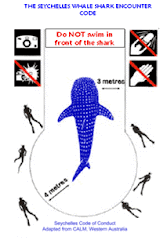
 The 2009 internship programme will last for 10 weeks from 24th August to 31st October. The first week will be an orientation and training week, week two will hopefully be getting some practice whale shark trips and helping the pilots set up the micro-light aircraft, and as of week three (Sept 7th) the monitoring activities proper will be implemented.
The 2009 internship programme will last for 10 weeks from 24th August to 31st October. The first week will be an orientation and training week, week two will hopefully be getting some practice whale shark trips and helping the pilots set up the micro-light aircraft, and as of week three (Sept 7th) the monitoring activities proper will be implemented.
The six interns will work as two teams, one for each monitoring boat, and each team will be supervised by a team leader who in turn will work under the project leader. The two team leaders have worked with the MCSS programme for two years and both have considerable monitoring and volunteer organisational experience. The interns will be accommodated at the MCSS premises on the coast at Glacis, NW Mahe on a self-catering basis. The property has two bedrooms set out dormitory-style for a maximum of four persons each and each bedroom has an en-suite bathroom facility enabling male - female separation. There is a large living-room and kitchen for communal use with washing machine and all usual amenities. There is also a large veranda connecting the living accommodation to the MCSS office. Wireless internet service is available throughout the premises.
The interns’ training and duties will cover the full range of activities associated with the MCSS whale shark monitoring programme including:
- The Seychelles whale shark programme:- findings, achievements, why it exists- Study area orientation and geography
- Basic whale shark information and biology
- Whale shark data collection:- filling out forms, writing up data, the systems and spreadsheets
- Photo identification:- sorting and filing images, pre-process preparation, matching software
- Laser-metrics: measuring sharks using underwater laser with digital photography
- Snorkel training and water skills development for whale shark activities
- Communications training:- between micro-light and boat and between boats
- Boat operations:- logistics, protocols and safety
- Micro-light aerial survey support and data handling, software use
- Environmental monitoring equipment use, data capture and handling

The costs of the internship programme, inclusive of shared accommodation and training is Euro 2350 per person for the ten weeks. These costs do include utilities (power and water) but exclude food costs, private local travel and international travel to and from
For more information please download the information file (on the MCSS web site so may be slow!) and if you wish to apply please download and complete the application form.














